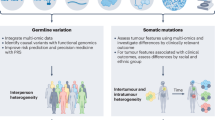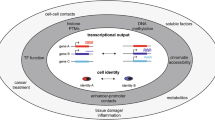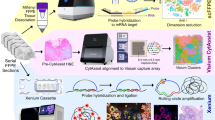Abstract
Understanding the molecular circuitry of the cancer cell is within the grasp of the basic scientist; however, harnessing this knowledge to predict cancer risk requires integration of molecular and population sciences. But, what role, if any, does race/ethnicity have in cancer research and, more specifically, in the nature of genetic and epigenetic alterations that programme the malignant behaviour of the cancer cell?
This is a preview of subscription content, access via your institution
Access options
Subscribe to this journal
Receive 12 print issues and online access
$259.00 per year
only $21.58 per issue
Buy this article
- Purchase on SpringerLink
- Instant access to the full article PDF.
USD 39.95
Prices may be subject to local taxes which are calculated during checkout

Similar content being viewed by others
References
Cavalli-Sforza, L. L. & Bodmer, W. F. The Genetics of Human Populations (W. H. Freeman, San Francisco, 1971).
Lee, S. S., Mountain, J. & Koenig, B. A. The meanings of “race” in the new genomics: implications for health disparities research. Yale J. Health Policy Law Ethics 1, 33–75 (2001).
Weir, H. K. et al. Annual report to the nation on the status of cancer, 1975-2000, featuring the uses of surveillance data for cancer prevention and control. J. Natl Cancer Inst. 95, 1276–1299 (2003).
Howe, H. L. et al. Annual report to the nation on the status of cancer (1973 through 1998), featuring cancers with recent increasing trends. J. Natl Cancer Inst. 93, 824–842 (2001).
Ragland, K. E., Selvin, S. & Merrill, D. W. Black–white differences in stage-specific cancer survival: analysis of seven selected sites. Am. J. Epidemiol. 133, 672–682 (1991).
Carter, C. L., Allen, C. & Henson, D. E. Relation of tumor size, lymph node status, and survival in 24,740 breast cancer cases. Cancer 63, 181–187 (1989).
Boyer-Chammard, A., Taylor, T. H. & Anton-Culver, H. Survival differences in breast cancer among racial/ethnic groups: a population-based study. Cancer Detect. Prev. 23, 463–473 (1999).
O'Malley, C. D., Le, G. M., Glaser, S. L., Shema, S. J. & West, D. W. Socioeconomic status and breast carcinoma survival in four racial/ethnic groups: a population-based study. Cancer 97, 1303–1311 (2003).
Wrensch, M., Minn, Y., Chew, T., Bondy, M. & Berger, M. S. Epidemiology of primary brain tumors: current concepts and review of the literature. Neuro-oncol. 4, 278–299 (2002).
Barnholtz-Sloan, J. S., Sloan, A. E. & Schwartz, A. G. Racial differences in survival after diagnosis with primary malignant brain tumor. Cancer 98, 603–609 (2003).
Shaw, E. G. et al. Ethnic differences in survival of glioblastoma (GBM): a secondary analysis of the radiation therapy oncology group (ROTC) recursive partioning analysis (RPA) database. Neuro-oncol. 5, 296–297 (2003).
Schwartz, R. S. Racial profiling in medical research. N. Engl. J. Med. 344, 1392–1393 (2001).
Risch, N., Burchard, E., Ziv, E. & Tang, H. Categorization of humans in biomedical research: genes, race and disease [comment]. Genome Biol. 3, 2007 (2002).
Burchard, E. G. et al. The importance of race and ethnic background in biomedical research and clinical practice. N. Engl. J. Med. 348, 1170–1175 (2003).
Cavalli-Sforza, L. L. & Feldman, M. W. The application of molecular genetic approaches to the study of human evolution. Nature Genet. 33 (Suppl.), S266–S275 (2003).
Hadley, T. J. & Peiper, S. C. From malaria to chemokine receptor: the emerging physiologic role of the Duffy blood group antigen. Blood 89, 3077–3091 (1997).
Tournamille, C., Colin, Y., Cartron, J. P. & Le Van Kim, C. Disruption of a GATA motif in the Duffy gene promoter abolishes erythroid gene expression in Duffy-negative individuals. Nature Genet. 10, 224–228 (1995).
Smith, M. W. et al. Markers for mapping by admixture linkage disequilibrium in African American and Hispanic populations. Am. J. Hum. Genet. 69, 1080–1094 (2001).
Parra, E. J. et al. Ancestral proportions and admixture dynamics in geographically defined African Americans living in South Carolina. Am. J. Phys. Anthropol. 114, 18–29 (2001).
Neuhausen, S. L. et al. Haplotype and phenotype analysis of six recurrent BRCA1 mutations in 61 families: results of an international study. Am. J. Hum. Genet. 58, 271–280 (1996).
Berman, D. B. et al. A common mutation in BRCA2 that predisposes to a variety of cancers is found in both Jewish Ashkenazi and non-Jewish individuals. Cancer Res. 56, 3409–3414 (1996).
Moslehi, R. et al. BRCA1 and BRCA2 mutation analysis of 208 Ashkenazi Jewish women with ovarian cancer. Am. J. Hum. Genet. 66, 1259–1272 (2000).
Struewing, J. P. et al. The carrier frequency of the BRCA1 185delAG mutation is approximately 1 percent in Ashkenazi Jewish individuals. Nature Genet. 11, 198–200 (1995).
Roa, B. B., Boyd, A. A., Volcik, K. & Richards, C. S. Ashkenazi Jewish population frequencies for common mutations in BRCA1 and BRCA2. Nature Genet. 14, 185–187 (1996).
Robson, M. et al. BRCA-associated breast cancer: absence of a characteristic immunophenotype. Cancer Res. 58, 1839–1842 (1998).
Lee, J. S. et al. Survival after breast cancer in Ashkenazi Jewish BRCA1 and BRCA2 mutation carriers. J. Natl Cancer Inst. 91, 259–263 (1999).
Ravid, A. et al. Immunohistochemical analyses of sporadic and familial (185delAG carriers) ovarian cancer in Israel. Eur. J. Cancer 36, 1120–1124 (2000).
Yair, D. et al. p53 and WAF1 polymorphisms in Jewish-Israeli women with epithelial ovarian cancer and its association with BRCA mutations. BJOG 107, 849–854 (2000).
Gryfe, R., Di Nicola, N., Gallinger, S. & Redston, M. Somatic instability of the APC I1307K allele in colorectal neoplasia. Cancer Res. 58, 4040–4043 (1998).
Laken, S. J. et al. Familial colorectal cancer in Ashkenazim due to a hypermutable tract in APC. Nature Genet. 17, 79–83 (1997).
Prior, T. W. et al. The I1307K polymorphism of the APC gene in colorectal cancer. Gastroenterology 116, 58–63 (1999).
Rozen, P. et al. Prevalence of the I1307K APC gene variant in Israeli Jews of differing ethnic origin and risk for colorectal cancer. Gastroenterology 116, 54–57 (1999).
Woodage, T. et al. The APC I1307K allele and cancer risk in a community-based study of Ashkenazi Jews. Nature Genet. 20, 62–65 (1998).
Strul, H. et al. The I1307K adenomatous polyposis coli gene variant does not contribute in the assessment of the risk for colorectal cancer in Ashkenazi Jews. Cancer Epidemiol. Biomarkers Prev. 12, 1012–1015 (2003).
Tobacco use among U. S. racial/ethnic minority groups: African Americans, American Indians and Alaska Natives, Asian Americans and Pacific Islanders, Hispanics. A Report of the Surgeon General. Executive summary. MMWR Recomm. Rep. 47, 1–16 (1998).
Kensler, T. W., Qian, G. S., Chen, J. G. & Groopman, J. D. Translational strategies for cancer prevention in liver. Nature Rev. Cancer 3, 321–329 (2003).
Ming, L. et al. Dominant role of hepatitis B virus and cofactor role of aflatoxin in hepatocarcinogenesis in Qidong, China. Hepatology 36, 1214–1220 (2002).
Levy, L., Renard, C. A., Wei, Y. & Buendia, M. A. Genetic alterations and oncogenic pathways in hepatocellular carcinoma. Ann. NY Acad. Sci. 963, 21–36 (2002).
Shapiro, G. I., Edwards, C. D. & Rollins, B. J. The physiology of p16INK4A-mediated G1 proliferative arrest. Cell Biochem. Biophys. 33, 189–197 (2000).
Liggett, W. H. Jr & Sidransky, D. Role of the p16 tumor suppressor gene in cancer. J. Clin. Oncol. 16, 1197–1206 (1998).
Armstrong, A. A. et al. Epstein–Barr virus and Hodgkin's disease: further evidence for the three disease hypothesis. Leukemia 12, 1272–1276 (1998).
Munoz, N. et al. Risk factors for HPV DNA detection in middle-aged women. Sex Transm. Dis. 23, 504–510 (1996).
Fukayama, M., Chong, J. M. & Uozaki, H. Pathology and molecular pathology of Epstein–Barr virus-associated gastric carcinoma. Curr. Top. Microbiol. Immunol. 258, 91–102 (2001).
Young, L. S. & Murray, P. G. Epstein–Barr virus and oncogenesis: from latent genes to tumours. Oncogene 22, 5108–5121 (2003).
Chong, J. M. et al. Global and non-random CpG-island methylation in gastric carcinoma associated with Epstein–Barr virus. Cancer Sci. 94, 76–80 (2003).
Vo, Q. N. et al. Epstein–Barr virus in gastric adenocarcinomas: association with ethnicity and CDKN2A promoter methylation. J. Clin. Pathol. 55, 669–675 (2002).
Mochizuki, S. et al. Homozygous deletion of the p16/MTS-1/CDKN2 gene in malignant gliomas is infrequent among Japanese patients. Int. J. Oncol. 15, 983–989 (1999).
Prives, C. & Hall, P. A. The p53 pathway. J. Pathol. 187, 112–126 (1999).
Oren, M. et al. Regulation of p53: intricate loops and delicate balances. Biochem. Pharmacol. 64, 865–871 (2002).
Olivier, M. et al. The IARC TP53 database: new online mutation analysis and recommendations to users. Hum. Mutat. 19, 607–614 (2002).
Chen, P. et al. Ethnicity delineates different genetic pathways in malignant glioma. Cancer Res. 61, 3949–3954 (2001).
Burton, E. C. et al. Aberrant p53, mdm2, and proliferation differ in glioblastomas from long-term compared with typical survivors. Clin. Cancer Res. 8, 180–187 (2002).
Hill, K. A. & Sommer, S. S. p53 as a mutagen test in breast cancer. Environ. Mol. Mutagen. 39, 216–227 (2002).
Middleton, L. P., Chen, V., Perkins, G. H., Pinn, V. & Page, D. Histopathology of breast cancer among African-American women. Cancer 97, 253–257 (2003).
Rose, D. P. & Royak-Schaler, R. Tumor biology and prognosis in black breast cancer patients: a review. Cancer Detect. Prev. 25, 16–31 (2001).
Li, C. I., Malone, K. E. & Daling, J. R. Differences in breast cancer hormone receptor status and histology by race and ethnicity among women 50 years of age and older. Cancer Epidemiol. Biomarkers Prev. 11, 601–607 (2002).
Paschke, T. Analysis of different versions of the IARC p53 database with respect to G→T transversion mutation frequencies and mutation hotspots in lung cancer of smokers and non-smokers. Mutagenesis 15, 457–458 (2000).
Pernick, N. L. et al. Clinicopathologic analysis of pancreatic adenocarcinoma in African Americans and Caucasians. Pancreas 26, 28–32 (2003).
Hunt, J. D. et al. Differences in KRAS mutation spectrum in lung cancer cases between African Americans and Caucasians after occupational or environmental exposure to known carcinogens. Cancer Epidemiol. Biomarkers Prev. 11, 1405–1412 (2002).
Piyathilake, C. J. et al. Race- and age-dependent alterations in global methylation of DNA in squamous cell carcinoma of the lung (United States). Cancer Causes Control 14, 37–42 (2003).
Ashktorab, H. et al. High incidence of microsatellite instability in colorectal cancer from African Americans. Clin. Cancer Res. 9, 1112–1117 (2003).
Carroll, W. L. Race and outcome in childhood acute lymphoblastic leukemia. JAMA 290, 2061–2063 (2003).
Bhatia, S. et al. Racial and ethnic differences in survival of children with acute lymphoblastic leukemia. Blood 100, 1957–1964 (2002).
Kadan-Lottick, N. S., Ness, K. K., Bhatia, S. & Gurney, J. G. Survival variability by race and ethnicity in childhood acute lymphoblastic leukemia. JAMA 290, 2008–2014 (2003).
Pui, C. H. et al. Results of therapy for acute lymphoblastic leukemia in black and white children. JAMA 290, 2001–2007 (2003).
Stephens, J. C. et al. Haplotype variation and linkage disequilibrium in 313 human genes. Science 293, 489–493 (2001).
Lin, S. S. & Kelsey, J. L. Use of race and ethnicity in epidemiologic research: concepts, methodological issues, and suggestions for research. Epidemiol. Rev. 22, 187–202 (2000).
Wilson, J. F. et al. Population genetic structure of variable drug response. Nature Genet. 29, 265–269 (2001).
Desai, A. A., Innocenti, F. & Ratain, M. J. Pharmacogenomics: road to anticancer therapeutics nirvana? Oncogene 22, 6621–6628 (2003).
Devlin, B., Roeder, K. & Wasserman, L. Genomic control, a new approach to genetic-based association studies. Theor. Popul. Biol. 60, 155–166 (2001).
Kim, D. H. et al. p16INK4a and histology-specific methylation of CpG islands by exposure to tobacco smoke in non-small cell lung cancer. Cancer Res. 61, 3419–3424 (2001).
Soria, J. C. et al. Aberrant promoter methylation of multiple genes in bronchial brush samples from former cigarette smokers. Cancer Res. 62, 351–355 (2002).
Toyooka, S. et al. Smoke exposure, histologic type and geography-related differences in the methylation profiles of non-small cell lung cancer. Int. J. Cancer 103, 153–160 (2003).
Yanagawa, N. et al. Frequent epigenetic silencing of the p16 gene in non-small cell lung cancers of tobacco smokers. Jpn. J. Cancer Res. 93, 1107–1113 (2002).
Kersting, M. et al. Differential frequencies of p16INK4a promoter hypermethylation, p53 mutation, and K-ras mutation in exfoliative material mark the development of lung cancer in symptomatic chronic smokers. J. Clin. Oncol. 18, 3221–3229 (2000).
Hasegawa, M. et al. Patterns of gene promoter methylation in squamous cell cancer of the head and neck. Oncogene 21, 4231–4236 (2002).
Gasco, M. et al. Epigenetic inactivation of 14-3-3 σ in oral carcinoma: association with p16INK4a silencing and human papillomavirus negativity. Cancer Res. 62, 2072–2076 (2002).
Osawa, T. et al. Reduced expression and promoter methylation of p16 gene in Epstein–Barr virus-associated gastric carcinoma. Jpn. J. Cancer Res. 93, 1195–1200 (2002).
Tong, J. H. et al. Quantitative Epstein–Barr virus DNA analysis and detection of gene promoter hypermethylation in nasopharyngeal (NP) brushing samples from patients with NP carcinoma. Clin. Cancer Res. 8, 2612–2619 (2002).
Yang, J. M. et al. Effect of HCV infection on expression of several cancer-associated gene products in HCC. World J. Gastroenterol. 5, 25–27 (1999).
Shim, Y. H., Yoon, G. S., Choi, H. J., Chung, Y. H. & Yu, E. p16 hypermethylation in the early stage of hepatitis B virus-associated hepatocarcinogenesis. Cancer Lett. 190, 213–219 (2003).
Platt, G., Carbone, A. & Mittnacht, S. p16INK4a loss and sensitivity in KSHV associated primary effusion lymphoma. Oncogene 21, 1823–1831 (2002).
Fang, J. Y., Mikovits, J. A., Bagni, R., Petrow-Sadowski, C. L. & Ruscetti, F. W. Infection of lymphoid cells by integration-defective human immunodeficiency virus type 1 increases de novo methylation. J. Virol. 75, 9753–9761 (2001).
Acknowledgements
J.K.W. is supported by the National Institutes of Environmental Health Sciences.
Author information
Authors and Affiliations
Ethics declarations
Competing interests
The author declares no competing financial interests.
Related links
Related links
DATABASES
Cancer.gov
LocusLink
FURTHER INFORMATION
International Agency for Research on Cancer TP53 mutation database
Rights and permissions
About this article
Cite this article
Wiencke, J. Impact of race/ethnicity on molecular pathways in human cancer. Nat Rev Cancer 4, 79–84 (2004). https://doi.org/10.1038/nrc1257
Issue date:
DOI: https://doi.org/10.1038/nrc1257
This article is cited by
-
Clinicopathological features of breast cancer with different molecular subtypes in chinese women
Journal of Huazhong University of Science and Technology [Medical Sciences] (2013)
-
Cancer is a Preventable Disease that Requires Major Lifestyle Changes
Pharmaceutical Research (2008)
-
Racial/ethnic differences in survival among elderly patients with a primary glioblastoma
Journal of Neuro-Oncology (2007)
-
Deconstructing the relationship between genetics and race
Nature Reviews Genetics (2004)
-
The interleukin-6 gene: a susceptibility factor that may contribute to racial and ethnic disparities in breast cancer mortality
Breast Cancer Research and Treatment (2004)



